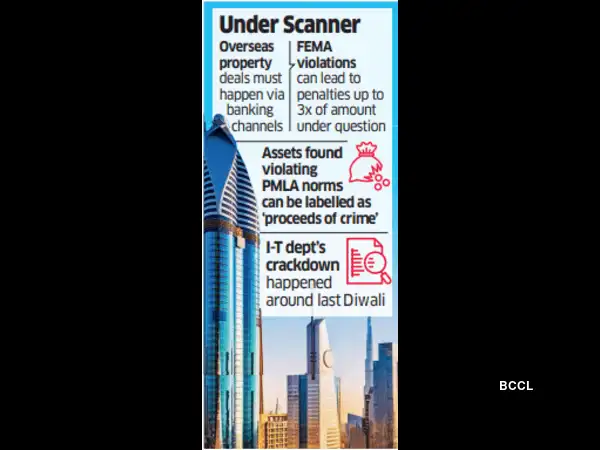Under the regulations, money remittance for overseas capital account transactions like buying apartments and stocks, or booking FDs with an offshore bank must happen through banking channels.
But, if banks were not used, ED, acting on the data received from the I-T department, will examine possible violations of the Foreign Exchange Management Act (FEMA) and the Prevention of Money Laundering Act (PMLA).
“ED is investigating a few cases of payments made by transferring crypto coins to builders’ wallets. Also, there have been cases where ultra-rich residents had used credit cardswith no pre-set limits to buy properties or set up companies in the UAE Free Trade Zones. These violate FEMA Regulations,” said Anup P. Shah, partner PPS & Co., a tax and legal advisory firm.

“A resident individual can do such transactions only under the RBI’s Liberalised Remittance Scheme (LRS). This involves remittance through an authorised dealer bank and submitting necessary forms and declarations,” he added. Under LRS, a resident individual can remit $250,000 a year.UAE developers have been freely accepting cryptocurrencies — a practice that could face restrictions under a new crypto regime the Emirates is likely to introduce.
However, moving cryptos, even those purchased with tax paid earnings in India, through a blockchain network to buy an asset abroad can be construed as a breach of FEMA — because, such peer-to-peer digital coin deals, from a resident’s private wallet to that of a UAE realtor or broker, sidesteps banks.
Besides ignorance of rules, such deals happen for different reasons: saving on banking and currency conversion charges; escaping the crippling crypto tax in India; preserving the LRS limit; or having earlier bought cryptos in an overseas exchange — a transaction most banks don’t allow under LRS — some subsequently invested the cryptos in overseas properties which were not declare in I-T return.
Use of Black Money Act & PMLA No one feared that Indian authorities would come to know about their Dubai homes because under the information sharing pacts, countries share only details of financial investments (like bank accounts and stock holdings) and not physical assets like properties. Their travails with the I-T department, and now with the ED, began after the tax office got hold of the data on UAE property ownership. Industry circles believe the information was not shared by the UAE but collected by Indian officials based in Dubai and brought to India through another country.
Irrespective of how the data was obtained, residents must now explain their source of funds. Under the Black Money law (relating to undisclosed foreign assets), the tax and penalty could be 120% of the property value. Transgressions of FEMA could mean extra outgo of one to three times the number.
Persons who bought properties by moving money to Dubai through illegal routes like the age-old hawala network could face prosecution under PMLA which would label the assets as “proceeds of crime” — properties purchased with tainted money are also stained. Under PMLA there is no scope of compounding — the process of voluntarily admitting the contravention, pleading guilty and paying fine. “A probe under PMLA will merit in cases where the I-T makes a case under the Black Money Act as it amounts to a scheduled offence,” said an official.








